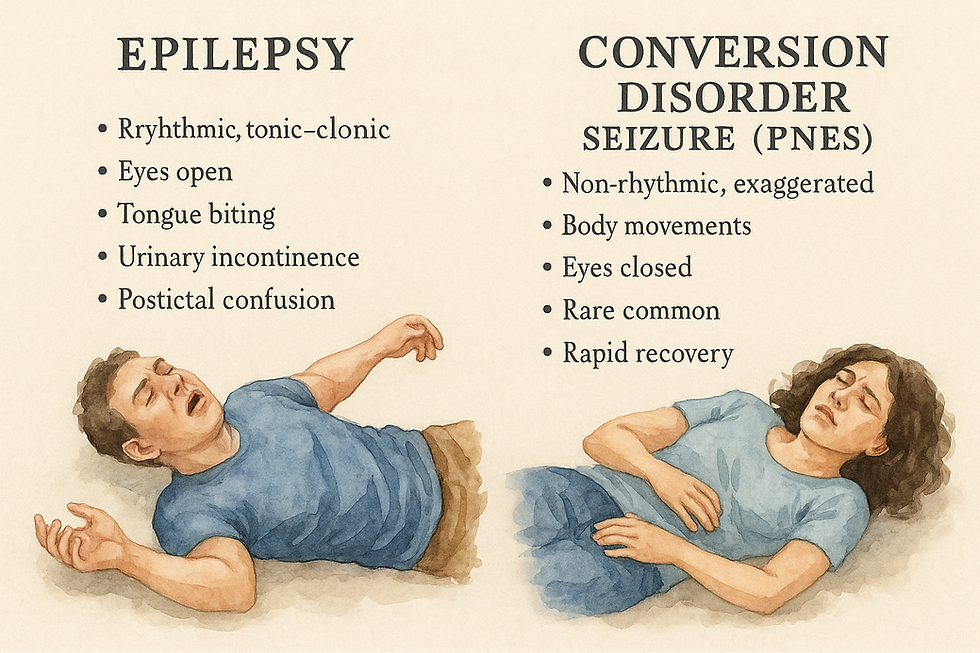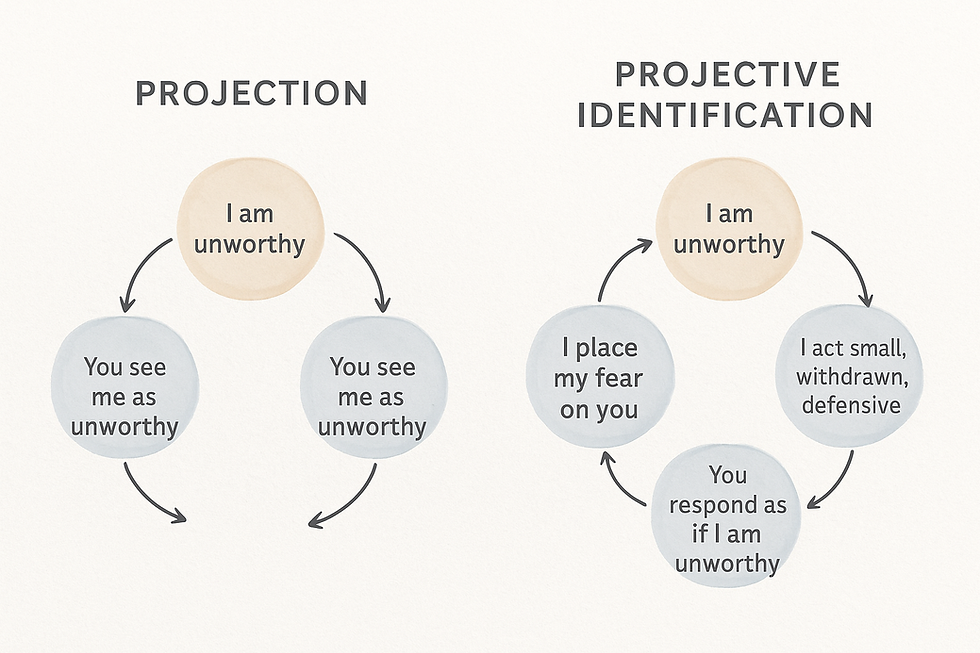What is difference between Epilepsy and Conversion?
- Sep 1
- 4 min read
What is Epilepsy?
Epilepsy is a chronic neurological disorder characterized by recurrent, unprovoked seizures. A seizure is caused by abnormal electrical activity in the brain, leading to sudden changes in behavior, movements, feelings, or levels of consciousness.
A person is generally diagnosed with epilepsy if they:
Have had two or more unprovoked seizures, OR
One seizure with a high risk of recurrence, and supporting evidence (e.g., abnormal EEG, brain lesion on MRI)
Symptoms of Epilepsy
Symptoms depend on the type of seizure and the area of the brain affected. Seizures are usually classified into focal (partial) and generalized.
🔹 General Symptoms (Across Types)
Sudden collapse or falling
Staring blankly into space
Uncontrollable jerking of arms and legs (convulsions)
Stiffening of the body
Loss of awareness or consciousness
Confusion or difficulty speaking post-seizure (postictal state)
Sudden emotional or sensory changes (fear, déjà vu, strange smells)
Types of Seizures in Epilepsy
1. Focal Seizures (Partial Seizures)
Originate in one part of the brain.
Focal Aware Seizures (Simple Partial)Person remains conscious. May have unusual sensations, twitching, or emotions.
Focal Impaired Awareness Seizures (Complex Partial)Impaired consciousness. May stare, perform repetitive movements (lip-smacking, hand movements), or seem dazed.
2. Generalized Seizures
Involve both sides of the brain.
Tonic-Clonic (Grand Mal):Full-body convulsions, stiffening, jerking, loss of consciousness, possible incontinence.
Absence Seizures (Petit Mal):Brief lapses in awareness, blank stare, subtle movements (eye fluttering). Often seen in children.
Myoclonic Seizures:Sudden brief jerks or twitches of muscles.
Atonic Seizures:Sudden loss of muscle tone — the person may fall like a rag doll.
Tonic Seizures:Sudden muscle stiffening, especially in back and limbs.
Clonic Seizures:Repetitive jerking movements.
Other Related Symptoms
Aura: A warning sensation before a seizure (strange smell, fear, flashing lights).
Postictal State: Confusion, fatigue, headache, or temporary paralysis after a seizure.
Injuries: Bruises, bites on the tongue, or falls due to convulsions.
When to Seek Help
Seek immediate medical care if:
Seizure lasts more than 5 minutes
Repeated seizures without regaining consciousness
Difficulty breathing or waking after seizure
Injury during seizure
First-time seizure

Difference Between Seizure (Epileptic) and Conversion Disorder (Non-Epileptic Seizures - PNES)
Both conditions present with seizures, but their origins and characteristics differ significantly.
1. Epileptic Seizures (Seizures due to Neurological Causes)
Cause: Abnormal electrical activity in the brain.
Diagnostic Marker: EEG (Electroencephalogram) shows abnormal brain activity.
Trigger: Can occur due to brain injury, stroke, tumors, infections, or genetic conditions.
Awareness During Event: Usually impaired consciousness or confusion afterward (postictal state).
Movements: Rhythmic, tonic-clonic (jerking, stiffness).
Eyes: Typically open, deviating to one side.
Tongue Biting: Common (especially side of tongue).
Urinary Incontinence: Frequent.
Post-Seizure Symptoms: Confusion, exhaustion, and headache.
Response to Anti-Seizure Medication: Usually improves with anti-epileptic drugs (AEDs).
Duration: Typically less than 2 minutes.
Provoked By: Flashing lights, sleep deprivation, fever, or metabolic imbalances.
2. Psychogenic Non-Epileptic Seizures (PNES) - Conversion Disorder Seizures
Cause: Psychological distress (often linked to trauma or unresolved conflict).
Diagnostic Marker: Normal EEG during the event (no abnormal brain activity).
Trigger: Emotional stress, trauma, PTSD, anxiety.
Awareness During Event: Can have some awareness or recall of the event.
Movements: More variable, asynchronous, or exaggerated (not rhythmic like epilepsy).
Eyes: Typically closed.
Tongue Biting: Rare.
Urinary Incontinence: Less common.
Post-Seizure Symptoms: No postictal confusion; rapid recovery.
Response to Anti-Seizure Medication: Does not improve with AEDs.
Duration: Often longer than 2 minutes (sometimes over 5 minutes).
Provoked By: Emotional distress, traumatic memories, psychological conflict.
Key Differentiating Factors Epilepsy Vs Conversion
Feature | Epileptic Seizure | Conversion Seizure (PNES) |
Cause | Abnormal brain activity | Psychological stress |
EEG Findings | Abnormal (seizure activity) | Normal |
Trigger | Physiological (e.g., brain injury) | Psychological (stress, trauma) |
Body Movements | Rhythmic, tonic-clonic | Non-rhythmic, exaggerated |
Eye Status | Open | Closed |
Tongue Biting | Side of tongue | Rare |
Urinary Incontinence | Common | Less common |
Postictal Confusion | Present | Absent |
Response to Medications | Improves with AEDs | No response to AEDs |
Duration | Usually <2 minutes | Often >2 minutes |
Provoked By | Physical triggers | Emotional stress |
Clinical Diagnosis
EEG Testing: If a seizure occurs and EEG shows no abnormal brain activity, PNES is likely.
Video EEG Monitoring: Gold standard to distinguish between epileptic and non-epileptic seizures.
Psychiatric Assessment: History of trauma, dissociation, or emotional distress supports PNES.
Physical Exam During Event: Non-epileptic seizures often have non-stereotypical movements, avoidance of injury, and resistance to eye-opening.
Management
Epileptic Seizures
Neurologist referral
Anti-epileptic medication (AEDs)
Lifestyle modifications (sleep regulation, avoiding triggers)
Conversion Disorder Seizures (PNES)
Psychotherapy (CBT, trauma-focused therapy)
Stress management techniques
Education on the condition (helping patient understand it's not "faking" but a psychological response)
Avoiding unnecessary AEDs
In my personal practice, I’ve seen clients struggling for years—on epilepsy medication, undergoing tests, even fearing permanent neurological damage—only to discover the root was never electrical. It was emotional.
Conversion disorder seizures (also called PNES) can look exactly like epileptic ones, but they're not caused by abnormal brain activity. They're the body’s unconscious cry for help—often after unspoken trauma or unresolved psychological conflict.
What’s heartbreaking is the misdiagnosis. Many clients are labeled “epileptic” and medicated for years with zero relief, worsening anxiety, and no clarity.
That’s why awareness matters. And that’s why we do what we do at SEVEE.
Whether you’re:
Lost between epilepsy neurological and conversion psychological symptoms
Confused by unexplainable fainting or seizures
Looking for clarity after trauma or burnout
We’re just one session away.
Book an online session from anywhere in the world
Visit us in Ahmedabad for an in-person consultation
Get multidisciplinary support from trained psychologists and psychiatrists
We don’t medicate — we listen first.
"Don’t let a mistreated mind suffer like a mistreated brain.”
Book your clarity session today at www.sevee.care
Call us at +91 97127 77330 for offline appointments Ahmedabad, Gujarat, India




Comments